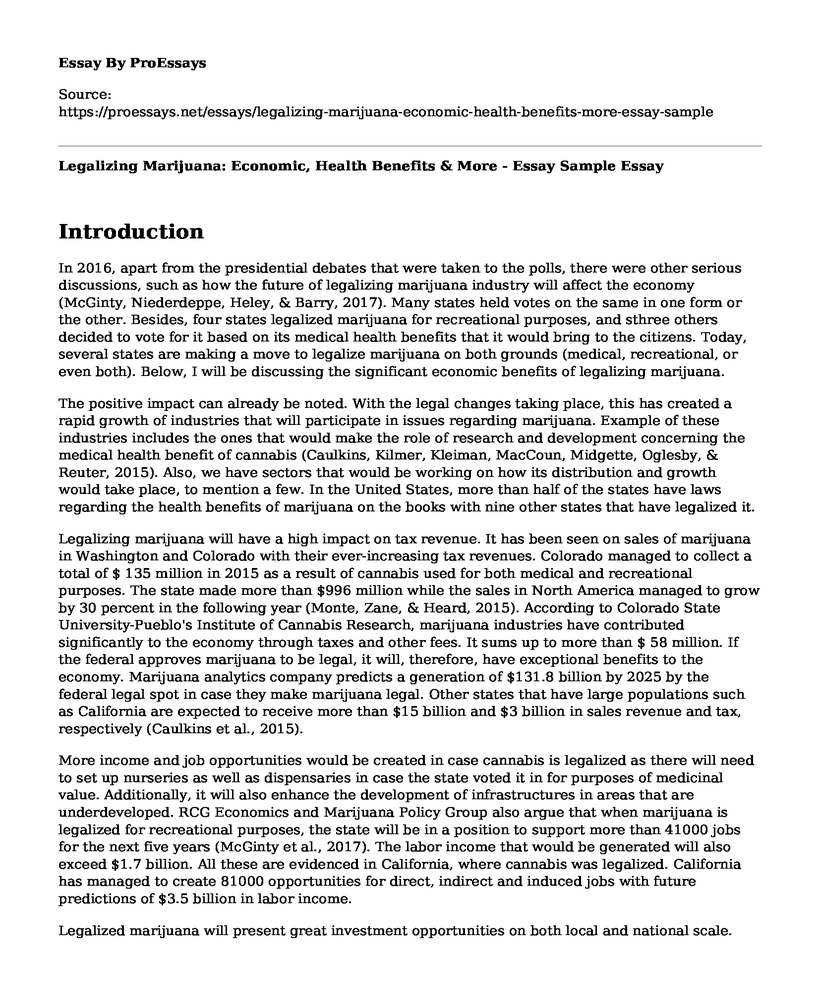Introduction
In 2016, apart from the presidential debates that were taken to the polls, there were other serious discussions, such as how the future of legalizing marijuana industry will affect the economy (McGinty, Niederdeppe, Heley, & Barry, 2017). Many states held votes on the same in one form or the other. Besides, four states legalized marijuana for recreational purposes, and sthree others decided to vote for it based on its medical health benefits that it would bring to the citizens. Today, several states are making a move to legalize marijuana on both grounds (medical, recreational, or even both). Below, I will be discussing the significant economic benefits of legalizing marijuana.
The positive impact can already be noted. With the legal changes taking place, this has created a rapid growth of industries that will participate in issues regarding marijuana. Example of these industries includes the ones that would make the role of research and development concerning the medical health benefit of cannabis (Caulkins, Kilmer, Kleiman, MacCoun, Midgette, Oglesby, & Reuter, 2015). Also, we have sectors that would be working on how its distribution and growth would take place, to mention a few. In the United States, more than half of the states have laws regarding the health benefits of marijuana on the books with nine other states that have legalized it.
Legalizing marijuana will have a high impact on tax revenue. It has been seen on sales of marijuana in Washington and Colorado with their ever-increasing tax revenues. Colorado managed to collect a total of $ 135 million in 2015 as a result of cannabis used for both medical and recreational purposes. The state made more than $996 million while the sales in North America managed to grow by 30 percent in the following year (Monte, Zane, & Heard, 2015). According to Colorado State University-Pueblo's Institute of Cannabis Research, marijuana industries have contributed significantly to the economy through taxes and other fees. It sums up to more than $ 58 million. If the federal approves marijuana to be legal, it will, therefore, have exceptional benefits to the economy. Marijuana analytics company predicts a generation of $131.8 billion by 2025 by the federal legal spot in case they make marijuana legal. Other states that have large populations such as California are expected to receive more than $15 billion and $3 billion in sales revenue and tax, respectively (Caulkins et al., 2015).
More income and job opportunities would be created in case cannabis is legalized as there will need to set up nurseries as well as dispensaries in case the state voted it in for purposes of medicinal value. Additionally, it will also enhance the development of infrastructures in areas that are underdeveloped. RCG Economics and Marijuana Policy Group also argue that when marijuana is legalized for recreational purposes, the state will be in a position to support more than 41000 jobs for the next five years (McGinty et al., 2017). The labor income that would be generated will also exceed $1.7 billion. All these are evidenced in California, where cannabis was legalized. California has managed to create 81000 opportunities for direct, indirect and induced jobs with future predictions of $3.5 billion in labor income.
Legalized marijuana will present great investment opportunities on both local and national scale. Also, investors will have the chance to invest in the country as well as other fields since it is difficult for them to put much into the development of industries when marijuana is still illegal (Monte et al, 2015). The legalization of cannabis will also make the companies associated with it to be in better positions to list their stock exchange rates thereby opening ways to more investors.
Conclusion
In conclusion, many things are hindering the idea of legalizing marijuana in the U.S. Some people say there would be confusion among the law enforcement officers that are planning to shift regulations. Other reasons include the fear that there will be a rise in the number of homeless people and also the excessive use of the drug by youths. These reasons reduce the likelihood of legalizing marijuana. However, as more states continue to approve individualized pot use in many ways, and as the economic benefits of legalizing marijuana take effect, they will be left with no other option but consider legalizing it.
References
Caulkins, J. P., Kilmer, B., Kleiman, M. A., MacCoun, R. J., Midgette, G., Oglesby, P., & Reuter, P. H. (2015). Options and issues regarding marijuana legalization. Rand Corporation. https://www.rand.org/content/dam/rand/pubs/perspectives/PE100/PE149/RAND_PE149.pdf
McGinty, E. E., Niederdeppe, J., Heley, K., & Barry, C. L. (2017). Public perceptions of arguments supporting and opposing recreational marijuana legalization. Preventive medicine, 99, 80-86. https://www.ncbi.nlm.nih.gov/pubmed/28189806
Monte, A. A., Zane, R. D., & Heard, K. J. (2015). The implications of marijuana legalization in Colorado. Jama, 313(3), 241-242. https://www.ncbi.nlm.nih.gov/pmc/articles/PMC4404298/
Cite this page
Legalizing Marijuana: Economic, Health Benefits & More - Essay Sample. (2023, Mar 29). Retrieved from https://proessays.net/essays/legalizing-marijuana-economic-health-benefits-more-essay-sample
If you are the original author of this essay and no longer wish to have it published on the ProEssays website, please click below to request its removal:
- Stalking and Domestic Violence Essay Example
- UK Charity Hit by Cyber Attack: NCA Investigates Data Theft
- Essay on US Healthcare Reform: Senate-House Passes Act for Lower Prescription Drug Cost
- Essay Example on Citizenship in America: A Constitutional Right and Responsibility
- Essay on South Australia Supreme Court Dismisses Public Advocate Appeal
- Paper Example on Analysis of MLK's Speech 'I've Been to the Mountaintop'
- Fredrick Douglass: Icon of American History & Civil Rights Movement - Essay Sample







